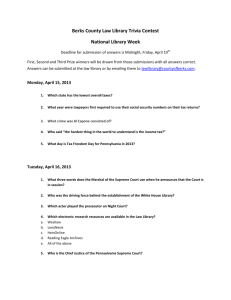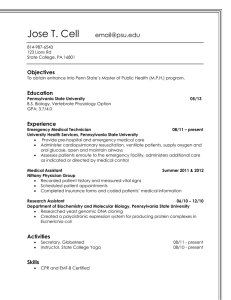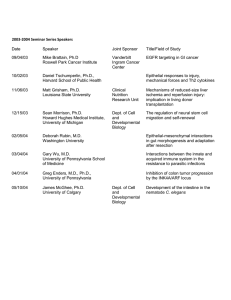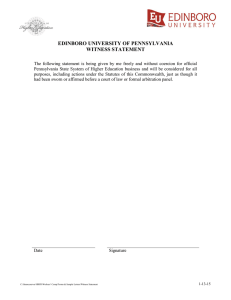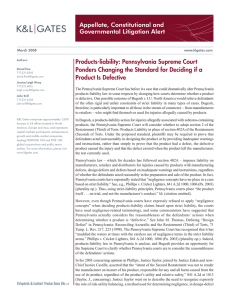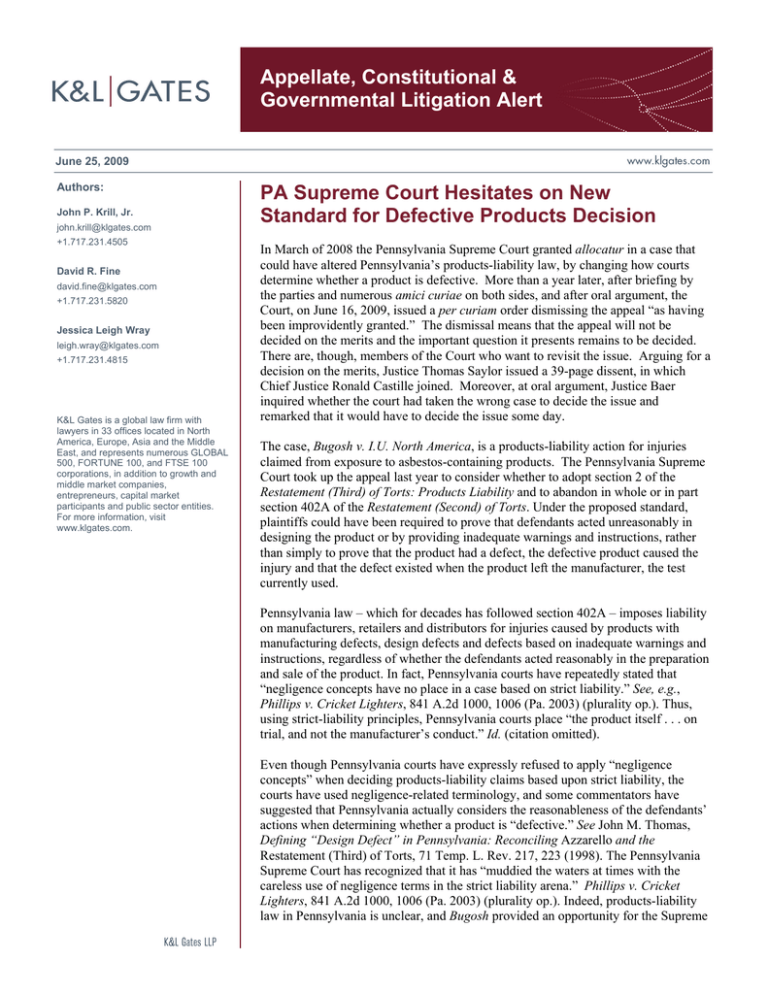
Appellate, Constitutional &
Governmental Litigation Alert
June 25, 2009
Authors:
John P. Krill, Jr.
john.krill@klgates.com
+1.717.231.4505
David R. Fine
david.fine@klgates.com
+1.717.231.5820
Jessica Leigh Wray
leigh.wray@klgates.com
+1.717.231.4815
K&L Gates is a global law firm with
lawyers in 33 offices located in North
America, Europe, Asia and the Middle
East, and represents numerous GLOBAL
500, FORTUNE 100, and FTSE 100
corporations, in addition to growth and
middle market companies,
entrepreneurs, capital market
participants and public sector entities.
For more information, visit
www.klgates.com.
PA Supreme Court Hesitates on New
Standard for Defective Products Decision
In March of 2008 the Pennsylvania Supreme Court granted allocatur in a case that
could have altered Pennsylvania’s products-liability law, by changing how courts
determine whether a product is defective. More than a year later, after briefing by
the parties and numerous amici curiae on both sides, and after oral argument, the
Court, on June 16, 2009, issued a per curiam order dismissing the appeal “as having
been improvidently granted.” The dismissal means that the appeal will not be
decided on the merits and the important question it presents remains to be decided.
There are, though, members of the Court who want to revisit the issue. Arguing for a
decision on the merits, Justice Thomas Saylor issued a 39-page dissent, in which
Chief Justice Ronald Castille joined. Moreover, at oral argument, Justice Baer
inquired whether the court had taken the wrong case to decide the issue and
remarked that it would have to decide the issue some day.
The case, Bugosh v. I.U. North America, is a products-liability action for injuries
claimed from exposure to asbestos-containing products. The Pennsylvania Supreme
Court took up the appeal last year to consider whether to adopt section 2 of the
Restatement (Third) of Torts: Products Liability and to abandon in whole or in part
section 402A of the Restatement (Second) of Torts. Under the proposed standard,
plaintiffs could have been required to prove that defendants acted unreasonably in
designing the product or by providing inadequate warnings and instructions, rather
than simply to prove that the product had a defect, the defective product caused the
injury and that the defect existed when the product left the manufacturer, the test
currently used.
Pennsylvania law – which for decades has followed section 402A – imposes liability
on manufacturers, retailers and distributors for injuries caused by products with
manufacturing defects, design defects and defects based on inadequate warnings and
instructions, regardless of whether the defendants acted reasonably in the preparation
and sale of the product. In fact, Pennsylvania courts have repeatedly stated that
“negligence concepts have no place in a case based on strict liability.” See, e.g.,
Phillips v. Cricket Lighters, 841 A.2d 1000, 1006 (Pa. 2003) (plurality op.). Thus,
using strict-liability principles, Pennsylvania courts place “the product itself . . . on
trial, and not the manufacturer’s conduct.” Id. (citation omitted).
Even though Pennsylvania courts have expressly refused to apply “negligence
concepts” when deciding products-liability claims based upon strict liability, the
courts have used negligence-related terminology, and some commentators have
suggested that Pennsylvania actually considers the reasonableness of the defendants’
actions when determining whether a product is “defective.” See John M. Thomas,
Defining “Design Defect” in Pennsylvania: Reconciling Azzarello and the
Restatement (Third) of Torts, 71 Temp. L. Rev. 217, 223 (1998). The Pennsylvania
Supreme Court has recognized that it has “muddied the waters at times with the
careless use of negligence terms in the strict liability arena.” Phillips v. Cricket
Lighters, 841 A.2d 1000, 1006 (Pa. 2003) (plurality op.). Indeed, products-liability
law in Pennsylvania is unclear, and Bugosh provided an opportunity for the Supreme
Appellate, Constitutional & Governmental Litigation Alert
Court to clarify whether Pennsylvania courts are to
consider the reasonableness of the defendants’
actions.
In his 2003 concurring opinion in Phillips, Justice
Saylor, joined by Justice Eakin and now-Chief
Justice Castille, asserted that the “intent of the
Second Restatement was not to render the
manufacturer an insurer of his product, responsible
for any and all harm caused from the use of its
product, regardless of the product’s utility and
relative safety.” 841 A.2d at 1013 (Saylor, J.,
concurring). Justice Saylor went on to describe the
need to recognize expressly the role of risk-utility
balancing, a method used for determining
negligence, in design-defect litigation and to suggest
that the Court look to the Restatement (Third) for an
alternative to the current law. Id. at 1015-16, 101819.
In his dissent from the dismissal of the Bugosh
appeal, Justice Saylor reviewed the history of the
Court’s jurisprudence on strict-liability in products
cases, pointing out the incongruities and the
scholarly critiques it has occasioned. In footnote 21
of his dissent, he hints at what may have motivated
the majority of justices to change their minds about
using Bugosh as a vehicle for considering a change
in precedent:
The present matter is a warnings case. Thus it
would be unusual for this appeal to be employed
as a vehicle to adopt a core aspect of Section 2
of the Third Restatement – the requirement of a
reasonable alternative design pertaining to
design-defect claims. . . My personal position is
that design matters were at issue in Phillips, and
this case represents a necessary extension of the
debate which initially crystallized there. I
recognize, however, that other Justices
(particularly those who did not participate in
Phillips) may hold a different view . . .
The Pennsylvania Supreme Court’s dismissal of the
Bugosh appeal may cause ripples in the federal
courts. On April 21, 2009, the United States Court
of Appeals for the Third Circuit decided a productsliability appeal that came to the federal courts
through diversity jurisdiction. In Berrier v.
Simplicity Manufacturing, Inc., the Third Circuit
predicted that the Pennsylvania Supreme Court, if
faced with the issue of a product manufacturer’s
liability to a mere bystander, not a user of the
product, would adopt Sections 1 and 2 of the
Restatement (Third) of Torts. The dismissal of
Bugosh does not mean that the Third Circuit’s
prediction was in error, just that the event that
would prove it true or false has not yet occurred.
One should expect that the federal courts will
continue to act in accordance with the Third
Circuit’s decision in Berrier until the issue is
decided by the Commonwealth’s highest court.
As noted in the March 31, 2008 alert on this subject,
Bugosh offered an opportunity to remove confusion
and to ameliorate the harsh and sometimes
unreasonable results of Pennsylvania’s often rigid
products-liability jurisprudence. The Pennsylvania
Supreme Court’s dismissal of the Bugosh appeal
postpones the decision that many judges and
lawyers expect it to reach eventually.
Anchorage Austin Beijing Berlin Boston Charlotte Chicago Dallas Dubai Fort Worth Frankfurt Harrisburg Hong Kong London
Los Angeles Miami Newark New York Orange County Palo Alto Paris Pittsburgh Portland Raleigh Research Triangle Park
San Diego San Francisco Seattle Shanghai Singapore Spokane/Coeur d’Alene Taipei Washington, D.C.
K&L Gates is a global law firm with lawyers in 33 offices located in North America, Europe, Asia and the Middle East, and represents numerous
GLOBAL 500, FORTUNE 100, and FTSE 100 corporations, in addition to growth and middle market companies, entrepreneurs, capital market
participants and public sector entities. For more information, visit www.klgates.com.
K&L Gates comprises multiple affiliated partnerships: a limited liability partnership with the full name K&L Gates LLP qualified in Delaware and
maintaining offices throughout the U.S., in Berlin and Frankfurt, Germany, in Beijing (K&L Gates LLP Beijing Representative Office), in Dubai,
U.A.E., in Shanghai (K&L Gates LLP Shanghai Representative Office), and in Singapore (K&L Gates LLP Singapore Representative Office); a
limited liability partnership (also named K&L Gates LLP) incorporated in England and maintaining offices in London and Paris; a Taiwan general
partnership (K&L Gates) maintaining an office in Taipei; and a Hong Kong general partnership (K&L Gates, Solicitors) maintaining an office in Hong
Kong. K&L Gates maintains appropriate registrations in the jurisdictions in which its offices are located. A list of the partners in each entity is
available for inspection at any K&L Gates office.
This publication is for informational purposes and does not contain or convey legal advice. The information herein should not be used or relied upon
in regard to any particular facts or circumstances without first consulting a lawyer.
©2009 K&L Gates LLP. All Rights Reserved.
June 25, 2009
2


